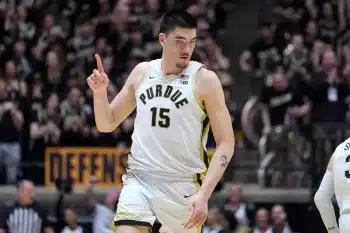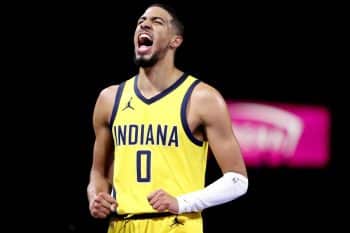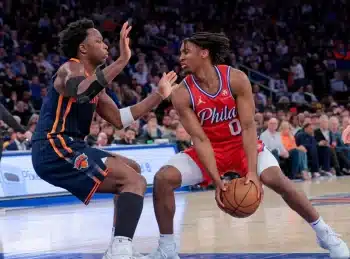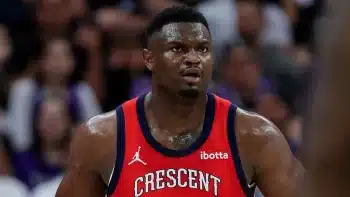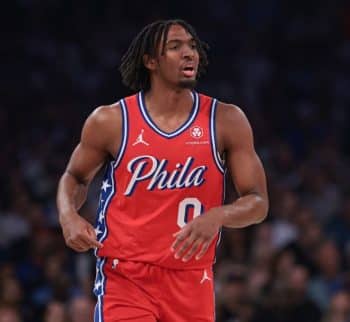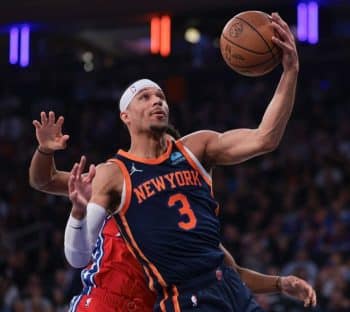NBA
NBA Sunday: Buddy Hield, Defying The Odds
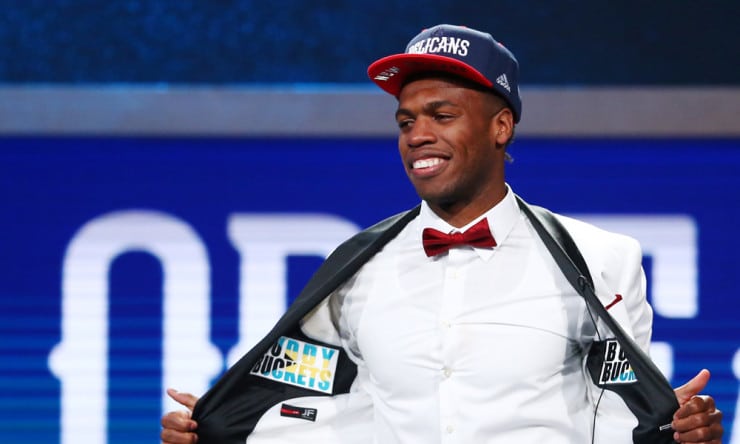
As he sat in the greenroom, his palms, no doubt, were a bit sweatier than usual.
Sure, in terms of basketball, Buddy Hield had been there and done that. The accolades had been a bit too numerous to comfortably fit on a single sheet of paper and last season’s Final Four run with his Oklahoma Sooners had its pressure packed moments.
Yet still, nothing could have prepared Hield for the night he had been dreaming of for as long as he can remember.
“I’m speechless right now,” he said.
As the bright lights gleamed down upon him, finally, after all these years, all the obstacles and all the early mornings and late nights, Buddy Hield had commenced the journey he had seemingly been waiting his entire life to embark upon.
NBA Player.
“Thank god I got the opportunity to play with New Orleans,” Hield said
And, for the sake of Dell Demps, Anthony Davis and their fans, thank god the New Orleans Pelicans made the wise choice.
* * * * * *
My Jamaican culture and lineage is important to me. It’s a part of my identity. Few things have made me prouder than watching Jamaica’s presence and place in the international basketball community grow. Over the past few years, as I have developed relationships with first-generation American and Canadian players with Caribbean connections and the Jamaican Basketball Federation, I have seen a lot.
And if you think American-born players from the inner-city have it tough, take a trip down to any one of several Caribbean islands.
In terms of basketball, the opportunity, the organization, the tutelage, the infrastructure—they are as scarce as winter coats in the Bahamas.
That’s why Buddy Hield, his rise and his progression are so personal to me.
I’ve been to the Bahamas and have spent a substantial amount of time in Jamaica. From an infrastructure and monetary standpoint, basketball is usually no higher than the third or fourth sport that Caribbean governments are willing to invest in. Soccer, cricket and track and field, for the most part, are the apples of the difference-makers’ eyes.
So while we show respect to Andrew Wiggins (Barbados), Cory Joseph (Trinidad) and Andre Drummond (Jamaica)—the three of whom all have Caribbean connections—we should show special respect to the Caribbean nationals who, despite all odds, are able to rise up and become professional basketball players.
So when you think of Buddy Hield, understand that his journey wasn’t easy. Opportunity wasn’t plentiful. Scouts and platforms to make impressions were scarce.
And after sustaining his greatness for so long, continually working and impressing everyone that meets him with his good manners and kind demeanor, there is no question that for Hield, merely getting to the NBA is a fantastic accomplishment. A great many player that he has played with and competed against in the FIBA Centrobasket tournament in 2014 could only dream of reaching that point.
So here and now, on the night of June 23, Hield couldn’t help but to reflect on the journey.
“I’m so happy,” he told the assembled media. “Not only for me, but for all the kids back in the Bahamas. The norm is that we never make it out there.”
Dashed hopes and lack of opportunity is synonymous with Caribbean basketball culture, and Skal Labissiere would cosign that sentiment, as well.
“I’m just happy for the Bahamas, really. Put them back on the map,” Hield said.
But even more so than that, Hield recognizes that with the likes of Jamaicans Samardo Samuels, Jerome Jordan and incoming rookie Shevon Thompson (who sources say is “close” on landing a summer league deal with an NBA team), as well as the overall growth of the game of basketball in the Caribbean, that the region needs to be scouted more closely.
“For sure, no doubt,” Hield said when I asked whether there are other undiscovered talents in the region.
“I think the Caribbean has been overlooked because guys don’t really have the resources to get out and guys are less fortunate to make it to the U.S. and get scholarships and for people to come down and see them.
“You think about the Bahamas, you think it’s this island full of beaches and chilling on the beach, but there’s a lot of freak athletes down there that can play, and a lot of guys better than me who I feel like didn’t get an opportunity like me. But when I got my opportunity, I took full advantage of it.”
There is something to be said for being in the right place in the right time, and there certainly is something to be said for being discovered. But there is a lot more that needs to be said about a young prospect who takes advantage of the opportunities he’s been afforded and pursues his goals with the tireless zeal that success requires.
* * * * * *
During the 2005-06 NBA season, after the departure of Phil Jackson and the unexpected resignation of Rudy Tomjanovich, Kobe Bryant did all that he could to ensure that the Los Angeles Lakers missing the playoffs in 2005 would not be something that would be repeated.
With Jackson surprisingly re-assuming the helm in Los Angeles, during his first year back, Bryant turned in his most historic season. En route to a 35.4 points per game average, it was during this fateful season that Bryant both scored 81 points against the Toronto Raptors and turned in a mystifying 62-point performance against the Dallas Mavericks. What made the feat against the Mavericks such an inspiration was that Bryant both scored all 62 of those points in three quarters and actually outscored the entire Mavericks team after three quarters, 62-61.
All the while, far, far away, Bryant was helping Hield to realize he loved the game.
“I saw Kobe Bryant playing,” Hield said with a smile when asked what caused him to pick up the basketball. “About 12 or 13 years old, it was something I fell in love with,” he said.
“I wasn’t the best, so I kept on working and working until I got my opportunity.”
But until that opportunity availed, Hield did all that he could do to ensure he would be ready. When asked about what kind of court condition he encountered, Hield would reveal that his first court was a “crate court” that he built himself in his grandmother’s backyard.
It was there that Hield began laying the foundation for what promises to be a stellar career.
Shevon Thompson, the former forward from George Mason University who grew up in Clarendon, Jamaica, recalled having to paint his own lines on his court and assemble and erect hoops and backboards. Mind you, Thompson wasn’t doing that at his grandmother’s house, he was doing it at his high school—Vere Technical.
In the Caribbean, these circumstances are typical. So know, anytime a Caribbean national bursts onto the scene at even the high school level in North America, that an immense amount of perseverance has likely taken place already.
With these types of players, the love for the game is real and the motivation is sincere.
That’s exactly why the smart money is on Buddy Hield.
With milk crates as his building blocks, this is an opportunity that Hield made with his bare hands.
* * * * * * *
In the moments after Adam Silver announced him as the sixth overall pick of the draft, Hield got a first-hand look at what the demands would be like. Being whisked around from corner to corner of Barclays Center, he shakes more hands than he can count and passes me no less than a half-dozen times.
With Bahamian media making the trip to New York City to see their own carry their hopes and dreams with him, Hield walks past the Brooklyn Nets locker room with an entourage that rivals Floyd Mayweather’s.
It would be reasonable to think that not all of the individuals are with Hield, but the unmistakable tone of Bahamian accents and Pelicans baseball caps would quickly convince anyone otherwise.
Without a doubt, Hield has brought his hometown of Eight Mile Rock with him.
And without a doubt, they are all in good hands.
“I already have something in mind to do, ready to do this summer, a camp,” Hield revealed.
“I just want to show the kids back home that there is a way,” he says. “If you really work toward your dream and push yourself and you have the right people behind you, you can make it.
“I’m just trying to motivate those kids back home because there’s a lot of great players back home that didn’t get what I got and now hopefully, people in America can get to see ‘Okay, there might be another Buddy down there,’” he says.
Personally, I have no doubt that there are more talented basketball players down in the Caribbean. But I also have no doubt that there is no other Buddy Hield down there—or anywhere.
Coming off of a disappointing season, the New Orleans Pelicans will look to Hield to make an immediate impact. And although it may be a tad soon to anoint him a perennial All-Star or a Hall-of-Famer, we know that Hield will put everything he has into fulfilling his true potential.
By virtue of merely getting to this point, in many ways, Hield has already shown us what he’s made of.
It just so happens to be the stuff that stars are made of, as well. By merely getting to this point, Buddy Hield has already proven that much.
